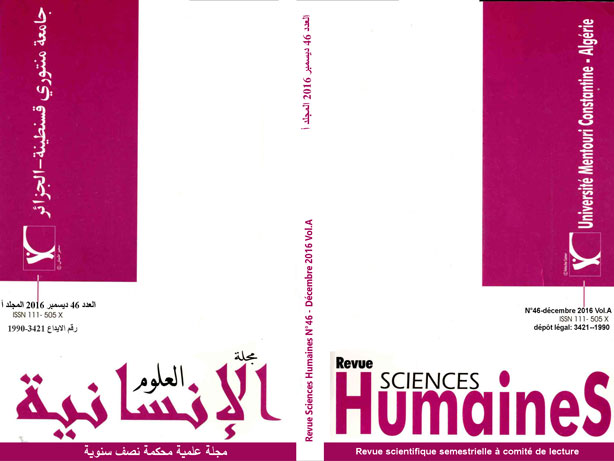Enhancing Learners’ Motivation and Speaking Skill through Cooperative Learning Activities
Keywords:
Enhancing Learners, Motivation, Speaking Skill, Cooperative Learning ActivitiesAbstract
The present research aims at investigating EFL learners’ motivation and English speaking skill development through the implementation of Cooperative Learning activities at the Department of Letters and English at Constantine University, with a sample of third year Didactics. In order to investigate the relationship between the three variables, we first conducted, at the very beginning of our study, a pre questionnaire that was administered to both of the experimental and the control groups, in order to know the students’ views concerning the Oral Expression module and the idea of working in groups. After that, we conducted a pre test for both groups to test the students’ level. Next, a six-week teaching experiment was conducted through the implementation of Cooperative Learning activities with the experimental group and the use of individualistic type of learning with the control group. At the end of the treatment, we administered a post test to the experimental and the control groups. The comparison of the results provided by the pre and post tests aims at determining the effect that the Cooperative Learning activities has on the students of the experimental group, as contrasted with the students of the control group who performed the tasks individually. At last, a post questionnaire was administered in the end of the experiment to the experimental group, so as to survey to what extent the Cooperative Learning activities could be useful in bolstering up the learners’ motivation, and developing their speaking skill. Additionally, a questionnaire was administered to Oral Expression teachers at the department of Letters and Languages at the University of Constantine, with the intention of discerning their assumptions and points of views regarding the effects of Cooperative Learning activities on students’ motivation and speaking skilldevelopment. Overall, the comparison of the pre and post tests’ results of both groups revealed that the students who worked cooperatively to perform the tasks assigned to them outscored the students who worked individually to solve a given task. These findings support our hypotheses, and are in the direction of many studies which emphasize that Cooperative Learning activities act as a bridge between motivation and speaking skill development.
Downloads
References
Bagarić, V. (2007). Defining communicative competence. Metodika, 8, 94-103.
Baily, K. M. (2005). Practical English language teaching: Speaking. NY: McGraw-Hill.
Brown, H. D. (2001) Teaching by principles: An interactive approach to language pedagogy. San Francisco: Pearson Education.
Brown, H. D. (2007) Principles of language learning and teaching (5th ed.). NY: Pearson Education.
Chaney, A.L., and T.L. Burk. (1998). Teaching Oral Communication in Grades K-8. Boston:
Allyn&Bacon.
Corder. S. P. (1981). Error and interlanguage. Great Britain: Oxford University Press.
Dornyei, Z. (1998). Motivation in second and foreign language learning. Cambridge: Cambridge University Press.
Florez, M. A. C. (1999). Improving adult English language learners’ speaking skills. Washington, DC: Clearinghouse for ESL Literacy Education. (Eric Document Reproduction Service No. EDO-LE-99-01).
Gass, S. M. & Selinker, L. (2008). Second language acquisition: An introductory
course. New York: Routledge.
Guilloteaux, M. J. (2007) Motivating language learners: a classroom-orientated
investigation of teachers' motivational practices and students'
motivation. PhD thesis, University of Nottingham.
Guilloteaux, M. J., & Dornyei, Z. (2008). Motivating language learners: A classroom oriented investigation of the effects of motivational strategies on students’ motivation. TESOL Quarterly, 42(1), 55-77.
Harmer, J. (2001). The practice of English language teaching (3rd ed.) UK: Pearson Education Limited.
Hedge, T. (2000). Teaching and learning in the language classroom. Oxford & NY: Oxford University Press.
Johnson, D. W., Johnson, R. T., & Holubec, E. J. (1994). The nuts and bolts of cooperative
learning. Minnesota Minnesota: Interaction Book Company. Retrieved from:
https://en.wikipedia.org/wiki/Cooperative_learning#cite_note-8
Kefee, J. (1979). Student learning styles: diagnosing and prescribing programs. Reston, VA: National Association of secondary School Principals.
Lier, V. L. (1995). Introducing language awareness. London: Penguin.
Nunan, D. (1989), Designing tasks for communicative classroom. New York. Cambridge University Press.
Richards, J.C. (1971). Error Analysis and Second Language Strategies. Quebec: ICRB.
Savignon, S. J. (1991). Communicative language leaching: The state of art. TESOL Quarterly, 25(2).
Singh, K. Y. (2006). Fundamental research methodology and statistics. New Delhi: New Age International (P) Ltd., Publishers.
Skehan, P. (1998). A Cognitive approach to language learning. Oxford: Oxford University Press.
Slavin, R. (1995). Cooperative learning: theory, research, and practice. (2nd ed.)
Allyn & Bacon: A Simon & Schuster Company. Needham Heights, Massachusetts.
Slavin, R. E. (2003). Educational psychology: Theory and practice (7th ed.). Boston: Pearson Education Inc.
Vallerand, R. J. (1997). Toward a hierarchical model of intrinsic and extrinsic
motivation. Advances in Experimental Social Psychology (Vol. 29, pp. 271-360). San Diego: Academic Press.
Williams, M. & Burden, R. L. (1997). Psychology of language teachers: A social
constructivist approach. UK: Cambridge University Press.
Yule, G. (2006). The Study of Language. Cambridge: Cambridge University Press

















